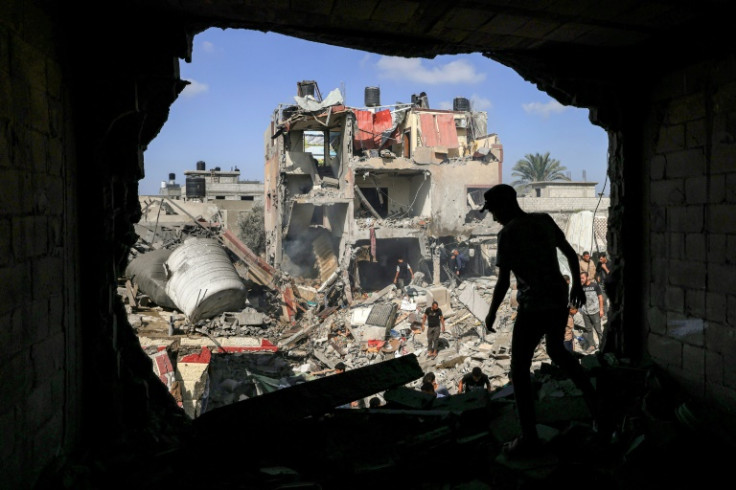Gaza Aid Conference Presses For Ceasefire

French President Emmanuel Macron on Thursday opened a conference on humanitarian aid for Gaza by calling for a "ceasefire", echoed by other delegates looking to support the Palestinian territory under bombardment by Israel since the October 7 attack by Hamas.
"In the immediate term, we need to work on protecting civilians. To do that, we need a humanitarian pause very quickly and we must work towards a ceasefire," Macron told delegates in Paris.
Israel has stayed away from the talks on aid for civilians in the enclave of 2.4 million people, where the Hamas-run health ministry says Israel's military campaign has killed more than 10,500 people, many of them children.
Hamas militants stormed across the border from Gaza into Israel on October 7, killing more than 1,400 people, mostly civilians, and taking some 240 hostages, Israeli officials say.
Vowing to destroy Hamas, Israel retaliated with a massive, relentless bombardment and ground invasion.
Tens of thousands of civilians have fled towards the south of the Gaza Strip.
But Moshe Tetro, an Israeli military officer handling civil affairs in Gaza, said on Thursday that although "the civil situation in the Gaza Strip is not an easy one", the state sees "no humanitarian crisis".
Israeli Prime Minister Benjamin Netanyahu on Wednesday reiterated that "there will be no ceasefire without the release of our hostages," saying he wanted to "put to rest... false rumours".
A Hamas source had earlier told AFP talks were underway for the release of a dozen hostages held by the Islamists, including six Americans, in return for a three-day ceasefire in Gaza.
"Israel has the right to defend itself and the duty to protect its own people," Macron said.
But the government "also has a clear responsibility... to respect the law and protect civilians," he added, warning that the humanitarian situation "is worsening more and more each day".
Thursday's aid conference has been put together in a hurry on the sidelines of the annual Paris Peace Forum on November 10-11.
It has brought together government representatives from many European countries, Egypt and the Palestinian Authority and a slew of aid groups, but no heads of government from the Arab world.
Egypt's foreign minister Sameh Shoukry said that "what the Israeli government is doing far exceeds the right to self-defence," accusing the state of "violations of international humanitarian law".
"How many Palestinians must die for this war to stop? Is it enough to kill six children and four women every hour?" Palestinian Authority Prime Minister Mohammad Shtayyeh asked delegates, urging them to "end the double standard" he said existed between Palestinian and Israeli casualties.
The UN estimates that $1.2 billion in aid will be needed for the populations of Gaza and the West Bank from now until the end of the year.
In Paris, delegates hope to reach a shared evaluation of the situation on the ground and to mobilise the international community to lend support -- although no joint declaration is planned at the end of the conference.
France's foreign ministry said there would be sections on donations of goods such as food, fuel and medical supplies, financial support and humanitarian access.
Macron said Paris would increase its financial support from 20 million to 100 million euros ($107 million).
But any promises of aid risk ringing hollow while supplies are being held up at the Gazan border.
"We're going to ask that aid enter Gaza because for now it's just a few trucks each day," Philippe Lazzarini, head of the United Nations' Palestinian refugee agency UNRWA, told broadcaster France Inter early on Thursday.
He added $100 million was needed just to pay salaries to UNRWA's 30,000 employees.
The world body has "never registered so many deaths in such a short time in a conflict" among its staff, he said.
International concern over the fate of Gaza's civilians, most of whom cannot flee the sealed-off territory, has strengthened calls for humanitarian "pauses" or a full ceasefire.
Both European and US leaders are "having difficulty convincing (Israel) that there should be humanitarian pauses as soon as possible", European Council head Michel told broadcaster France 2 early on Thursday.
"Israel has the right to defend itself, and this must be in line with the rules of international law," he added.
Independent UN expert Balakrishnan Rajagopal said on Wednesday that Israel's widespread and systematic bombardment of housing and civilian infrastructure in Gaza was a "war crime", as were indiscriminate Hamas rocket attacks that hit Israeli dwellings.
Israel has for now remained firm in keeping up its offensive, with the stated objective of destroying Hamas -- which has governed Gaza since 2007.
© Copyright AFP 2025. All rights reserved.





















